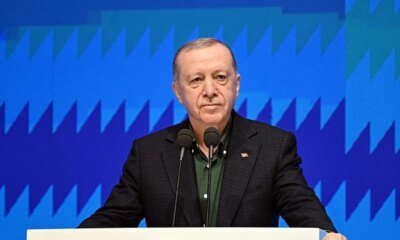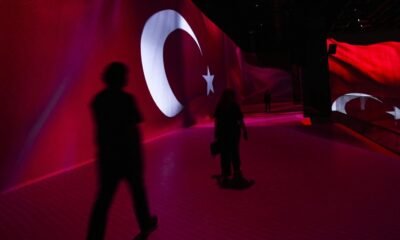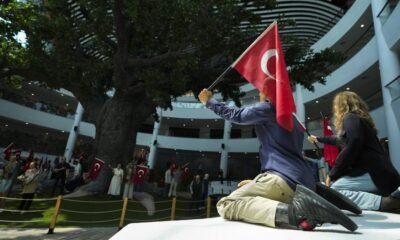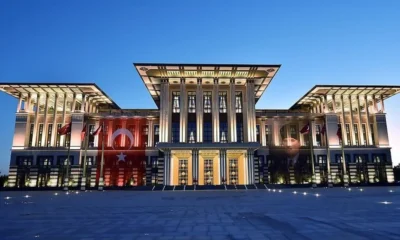Politics
PKK set to evacuate Iraq camps as terror-free Türkiye plan proceeds
The terror-free Türkiye initiative took hold on Friday as the first group of members of the PKK terrorist group burned their weapons as a gesture of disarmament in Iraq. Türkiye’s southeastern neighbor hosts 11 major camps occupied by the terrorist group, and in the next stage of the initiative, the group is expected to evacuate them, according to the media reports.
Qandil and Makhmour are among the significant camps controlled by the PKK, hosting senior leadership of the terrorist group.
For years, camps operated freely in Iraq amid the turmoil of war in that country. After U.S. troops withdrew, they remained intact, though Türkiye’s counterterrorism operations severely restricted the movement of PKK terrorists in mountainous territories in the north.
The terrorist group was founded 47 years ago in Lice, in the southeastern Turkish province of Diyarbakır, but moved its “operational bases” to Iraq when Turkish security forces closed in on them. Camps have been places where the group planned its attacks against Türkiye.
Sabah newspaper reported on Sunday that the Zap camp is among the most significant due to its proximity to the Turkish border. Iraq’s Kurdistan Regional Government (KRG) had already banned civilian access to camps due to security concerns. Zap is located right across from the Çukurca district of Türkiye’s Hakkari province. It has been a spot of infiltration for terrorists into Türkiye. Other camps in the nearby region include Sinat, Haftanin, Gara, Hakurk, Metina, Avasin-Basyan and Etrus. Camps operate similarly to refugee camps, but some host spacious caves where the PKK hides its arsenal. Some even have field hospitals and small dams to generate electricity. Turkish authorities expect them to be fully evacuated once the group completes its disarmament process.
The evacuation of Qandil will also be a turning point in counterterrorism efforts. The Qandil camp in the eponymous mountain has been a term to refer to the PKK’s leadership for years. The camp is located on the Iranian-Iraqi border. The Sinjar camp is located near the Syrian border, while the PKK also controls Makhmour in Mosul. Unofficial figures show Makhmour is home to 15,000 people.
On Saturday, Iraqi Prime Minister Muhammad Shia Al Sudani held a phone call with President Recep Tayyip Erdoğan on the PKK’s disarmament. A statement by Iraq’s Prime Ministry said that the disarmament would have a positive impact on the region and would contribute to the region’s stability and development. After years of tolerance, Iraq declared the PKK a banned organization in 2024, following Ankara’s diplomatic efforts with Baghdad and the KRG for a renewed push against the terrorist group.
Politics
As Türkiye defeats FETÖ, global network erodes
As Türkiye marks the ninth anniversary of the July 15, 2016, coup attempt, perpetrated by the Gülenist Terror Group (FETÖ), a new chapter is unfolding for the clandestine organization. With its founder and self-proclaimed spiritual leader Fethullah Gülen reportedly deceased in his Pennsylvania compound earlier this year, questions loom large over the fate of the group and its future influence, or lack thereof, both in Türkiye and abroad.
The organization, long accused of infiltrating the Turkish state over decades, orchestrated a brutal coup attempt that killed 252 people and injured thousands more. Since then, Türkiye has treated FETÖ as a national security threat, dismantling its networks and purging its operatives across institutions. Yet, while the domestic fight has yielded measurable success, the group’s overseas remnants continue to draw scrutiny.
According to Nur Özkan Erbay, head of the Brand Office of the Presidency’s Directorate of Communications and author of the book “Threat of Messianic Movements to State and Regime Security: A Case Study of the Fethullah Gülen Terrorist Organization,” FETÖ is now “in a vegetative state” following Gülen’s demise.
“FETÖ’s indoctrination was entirely tied to its so-called spiritual leader. With his elimination, the organization is effectively brain-dead,” Erbay told Daily Sabah in an exclusive interview. “Its vital functions within Türkiye have been irreversibly terminated. However, its presence in foreign countries, especially Western Europe and the United States, has merely gone underground.”
While FETÖ’s influence has diminished dramatically, Erbay emphasized that the group has not entirely vanished. Instead, its members have adopted more covert tactics. Their financial network has eroded amid internal power struggles and the loss of institutional privileges, particularly in the U.S. charter school system, where several affiliated schools are now facing mounting tax penalties.
“Due to increasing regulatory pressure from the U.S. tax and customs system, FETÖ is gradually losing its operational flexibility and immunity. Meanwhile, Western governments’ more restrictive policies toward immigration are making it harder for the group to recruit new members from Türkiye or third countries,” she added.
Indeed, Turkish officials have long argued that the group’s educational and media institutions abroad serve as both funding channels and fronts for espionage and influence operations. Reports over the years have highlighted the group’s tactics, including disguising identities, abandoning Turkish affiliations and using new aliases to infiltrate host country institutions.
Erbay also warned that despite its weakened state, FETÖ retains a troubling capacity for “asymmetric threats” – including blackmail, espionage and infiltration.
“The group still has human capital that can be repurposed for covert operations against foreign states,” she said. “That makes FETÖ not just a relic of Türkiye’s internal strife but an ongoing international threat.”
This assessment aligns with the view in Ankara, where officials stress that while FETÖ may be limping, it remains a strategic concern abroad. Turkish diplomacy in recent years has leaned on bilateral ties to encourage host nations to curtail the group’s operations – often with mixed results, especially in countries where FETÖ-linked institutions maintain legal protections.
Murat Aslan, a faculty member at Hasan Kalyoncu University and a researcher at SETA, pointed out that despite nine years, many questions remain unanswered.
“The anatomy of FETÖ is still not drawn, which is vital. Who created this group, Fethullah Gülen or was it created by other forces? What was the vision of Fethullah Gülen? What is the vision of the organization now? We have to decipher this. A comprehensive analysis must be made, extending beyond the military aspect, to examine how the group infiltrated all aspects of life.”
He similarly underlined that “the threat is not over yet” as the terrorist group continues operations, especially in countries in Africa or Central Asia.
Aslan further highlighted that FETÖ members in the West have taken critical positions, such as those of lecturers in universities, think tanks or technology companies. “We have to be prepared for this new kind of threat.”
Yet domestically, the picture is far more decisive.
The terrorist group faces operations almost daily as investigators still try to unravel its massive network of infiltrators everywhere. In 2024 alone, police apprehended hundreds of FETÖ suspects across the country, including fugitives on western borders trying to flee to Europe. Just last month, President Recep Tayyip Erdoğan underlined the determination in fighting the terrorist group, assuring authorities would root out the remaining FETÖ infiltrators in Turkish institutions, citing the “meticulous work of police and intelligence units.”
Ankara has also worked to secure extraditions and asset seizures globally, while pressuring allies to monitor and curtail the group’s educational and financial arms. The collapse of central leadership has added to the organization’s disintegration, with internal factions vying for control amid dwindling resources.
“The infighting, especially over succession and control of finances, has further debilitated the group,” said Erbay. “It’s no longer a monolith but a fragmented network with no coherent strategy.”
Türkiye’s long-term counter-FETÖ strategy has also evolved. No longer confined to security operations, Ankara has built enduring institutional resilience by reforming recruitment and oversight processes within the military, judiciary and bureaucracy. Furthermore, the state has expanded its geopolitical influence, bolstering international cooperation on counterterrorism.
“The era in which FETÖ could be instrumentalized against Türkiye has ended,” Erbay asserted. “Türkiye has established irreversible strategic leverage, both in national capabilities and in its regional and international standing. No actor can now afford to jeopardize its alliance with a stronger-than-ever Türkiye.”
Politics
‘Türkiye on the threshold of getting rid of terrorism’
Addressing a gathering of his Justice and Development Party (AK Party) on Sunday, President Recep Tayyip Erdoğan said that they were on the threshold of saving the nation from the shackles of terrorism, referring to the terror-free Türkiye initiative. He said Türkiye would be stronger in terms of security as well as economy with the end of terrorism.
The PKK terrorist group began laying down arms on Friday, a development hailed by Erdoğan in a historic speech on Saturday. In Sunday’s speech, Erdoğan said Ankara is hoping to have tangible results about the parliamentary committee that is set to be founded in the coming days to oversee the initiative.
The president also criticized opposition politicians and others opposing the initiative. “No one has a right to undermine (the terror-free Türkiye initiative), the nation won’t forgive efforts to hinder it,” he said.
He stated that the AK Party, along with government ally Nationalist Movement Party (MHP), and the Peoples’ Equality and Democracy Party (DEM Party), which relayed PKK leader Abdullah Öcalan’s messages to the terrorist group, were determined to bring the initiative to a successful conclusion.
On Saturday, Erdoğan addressed the nation at the same meeting and called for full support for the disarmament process.
Thirty PKK terrorists burned their weapons at the mouth of a cave in northern Iraq on Friday, marking a symbolic but significant step toward ending decadeslong violence that killed over 40,000 people in Türkiye.
Today is a new day; a new page has opened in history,” Erdoğan said on Saturday.
In the same speech, he said the recent steps have united the nation, and now Parliament will play a critical role in setting up a legal framework for completing the disarmament process. “I hope that our Parliament will support this process with the broadest possible participation,” Erdoğan said.
Erdoğan described the terrorist group’s decision to lay down arms as a victory for Türkiye, stating that Turks, Kurds, Arabs – all 86 million citizens –emerged as winners. Underlining a broader vision of regional unity, Erdoğan also said: “Today, the spirit of Malazgirt, the Jerusalem alliance, and the core of the War of Independence are being reshaped,” referring to past victories of Türkiye with the unity of Turks, Kurds and Arabs against common enemies.
In Saturday’s speech, he further noted that the scope of the initiative extends beyond Türkiye’s borders, stressing that a terror-free Türkiye is not only an issue for Kurdish citizens at home but also for Kurdish communities in Iraq and Syria, with the process actively discussed with them.
Politics
Parliament to set road map for terror-free Türkiye
The Terror-free Türkiye initiative that involves the disarmament of the PKK terrorist group enters another crucial week after the first batch of terrorists abandoned and burned their arms last Friday in a landmark step.
Parliament will work to set up a committee to oversee the initiative when it reconvenes on Wednesday. In the meantime, two lawmakers from the Peoples’ Equality and Democracy Party (DEM Party), colloquially known as the “Imralı delegation,” will hold talks with leaders of political parties, including the initiative’s architect, Devlet Bahçeli, leader of government ally Nationalist Movement Party (MHP) and Özgür Özel, chair of the main opposition Republican People’s Party (CHP).
The committee will be key to determining a legal framework for the next steps in the initiative for the complete dissolution of the PKK. Bahçeli has proposed that the committee can be named the “National Unity and Solidarity Committee” in a bid to underline that the initiative would enforce the notion of bonds between Turks and Kurds. Parliament Speaker Numan Kurtulmuş will formally request that political parties in Parliament submit the names of members to be elected to the committee on Wednesday. The ruling Justice and Development Party (AK Party), MHP, CHP, DEM Party and New Path (a coalition of three smaller parties) will likely contribute members to the committee, according to a report by the Hürriyet newspaper on Monday. The Good Party (IP), a far-right party that has long opposed the initiative, will reportedly opt out of the committee.
The number of committee members will be between 35 and 40, as other parties in Parliament that do not have parliamentary group status due to their limited number of seats will likely join it.
The committee will work until the end of this month and probably till August, as Parliament had already postponed its summer recess for its establishment. It will focus on legislative work for the legal framework of the initiative, although reports say the committee’s decisions will be “advisory.” Still, they may serve as guidelines for lawmakers for future discussions and probable amendments to laws to accommodate the requirements of the initiative. The committee will also hear ministers and bureaucrats involved in monitoring the initiative.
The Hürriyet newspaper reported that full disarmament of the PKK may take up to five months and the committee is expected to outline a roadmap for reintegration of PKK members into society, possible leniency in sentencing of the group’s members and confidence-building measures for integration of former members of the PKK not involved in acts of terrorism. Media reports say the initiative will also extend to PKK convicts and elderly, ill inmates convicted of membership in the terrorist group may benefit from leniency in their prison terms, pointing out existing laws for such convicts. But this will likely require removal of the PKK’s status as a national threat to Türkiye’s existence, something that the National Security Council, chaired by the president, has the final say.
Politics
Türkiye welcomes PKK disarmament with flags, good wishes
Flags adorned buildings across Türkiye, from the northwest to the southeast, as the PKK terrorist group took the first step to end its decades-old campaign of violence on Friday. President Recep Tayyip Erdoğan on Saturday hailed the first group of PKK members burning down their weapons in Iraq and called upon the public to hang Turkish flags on their homes and businesses to symbolize the beginning of a new era.
Public buildings were draped with flags on Sunday, just two days before another historic anniversary: Türkiye’s resistance against a 2016 coup attempt.
The beginning of the disarmament is warmly welcomed by the nation that suffered for years from terrorist attacks that have killed thousands since the 1980s. But it had a particularly special meaning for two groups of people: parents of the youth brainwashed to join the PKK and families of people killed in terror attacks.
Bedriye Uslu is among them. Uslu is part of “Diyarbakır Mothers,” a group of families who began a sit-in protest in the eponymous Turkish city in 2019 to protest the PKK’s recruitment of Kurdish youth. Hours after the first videos of PKK terrorists burning their weapons in Iraq emerged, Uslu spoke to Anadolu Agency (AA) and expressed her approval for the terror-free Türkiye initiative that led to the disarmament. She is among the mothers from 62 families staging the sit-in and joined them in the hope of a reunion with her son Mahmut, who left to join the PKK 14 years ago.
She thanked President Recep Tayyip Erdoğan and government ally Devlet Bahçeli, who informally launched the initiative last year when he called on the PKK’s jailed leader, Abdullah Öcalan, to convince his group to lay down arms.
“What happened in Iraq on Friday gave us hope. We hope all our children (who joined the PKK) will abandon their arms and burn them. I pray to Allah to see that day, to reunite with my son. We hope the tears of parents will end and everyone will be reunited with their children,” she said.
Nihat Aydın, who has taken part in the sit-in since it began for a reunion with his son Mehmet, said it was “symbolic” seeing 30 PKK members abandon arms, and it boosted their hope. “I hope my son will join them too,” he said.
Müslüme Topçu, whose soldier son Ahmet Topçu was killed in Operation Peace Spring against the PKK’s Syrian wing, echoed wishes for an end to terrorism.
Topçu told Sabah newspaper that her son was among the “thousands of sons who fell victim to terrorism.”
“We hope it will end now. We have high hopes for a terror-free Türkiye. May no other mother suffer from the loss of their children,” she said.
The PKK’s disarmament is also good news for Diyarbakır, a major city in the southeast with a large Kurdish population. Diyarbakır has been a hot spot of PKK terrorism, including the notorious “trench incidents” when the group’s members launched street attacks and dug “trenches” to confront the military between 2015 and 2016.
The province is known as the birthplace of the PKK, which recruited many to its ranks from Diyarbakır. Locals now hope that social peace will prevail in the province and that the economy will thrive.
Uğur Altınar, a shopkeeper in Diyarbakır’s historic Sur district, said they hoped more tourists would visit. Although at the heart of the southeastern region and boasting a rich history, Diyarbakır was shunned as a major tourism destination in the past due to heightened PKK activity, while other provinces in the region reaped the benefits of tourism.
“We will have more business, but more importantly, future generations will live in peace. I hope it will be good for the entire Türkiye,” Altınar told Ihlas News Agency (IHA) on Sunday.
Ali Baran Çelik, another business owner, said people who had second thoughts about Diyarbakır will “certainly visit the city now.” “It gives an opportunity for people from different parts of Türkiye to mingle with each other,” he said.
Associate professor Vahap Coşkun from Dicle University in Diyarbakır says Türkiye went through a critical threshold after the first group of PKK members laid down arms.
“This is a point of no return. We are in a new era where weapons are silenced, clashes have ended, and people can talk about their democratic demands. It will be good for everyone in Türkiye,” he said.
Mahmut Şimşek, head of the Diyarbakır-based NGO Social Consensus, said it has been more than 100 years since “people were united again,” referring to the War of Independence, in which Turks and Kurds fought together against invading forces.
“We need patience for the process to continue. It is too early to say that everything’s over after the first PKK group started abandoning arms. People should be well informed about this historic day. Regardless, they are witnessing the beauty of it. It has been more than 40 years, and for years, people cried over the graves of loved ones. It is everyone’s responsibility to ensure social consensus and peace; every politician, every opinion leader has a responsibility to use this historic opportunity,” Şimşek told IHA.
Şahismail Bedirhanoğlu, who leads a chamber of industrialists and businesspeople in Diyarbakır, says an era was over and a new one began after Friday’s disarmament ceremony.
“We are excited that weapons and violence are out of the equation now. Those two things plagued the region, especially its economy. The future will belong to democratic politics and both Türkiye and the region will have a great momentum in terms of economy, democratization and political reforms. I hope the developments will be a blessing for our country,” he said.
Politics
Leaders hail terror-free Türkiye success in phone calls with Erdoğan
President Recep Tayyip Erdoğan held phone calls with heads of state and government after the PKK terrorist group started disarmament on Friday.
On Saturday and Sunday, Erdoğan talked to Azerbaijani President Ilham Aliyev, Iraqi Prime Minister Mohammed Shia Al Sudani and United Arab Emirates (UAE) President Sheikh Mohammed bin Zayed Al Nahyan. The leaders wished further success in the terror-free Türkiye initiative that culminated in the first batch of PKK terrorists burning their weapons at a ceremony in northern Iraq.
The terror-free Türkiye plan was built upon a call by government ally Devlet Bahçeli, who last year urged PKK jailed leader Abdullah Öcalan to invite the group to abandon arms. Erdoğan endorsed the initiative, which was later shaped by visits to Öcalan by a PKK-linked party. In May, the PKK announced that it would heed Öcalan’s February call for dissolution.
Türkiye has taken a step to remove terrorism from both the country’s and the region’s agenda through its terror-free Türkiye initiative, Erdoğan told Sheikh Mohammed in his phone call.
During the call, Erdoğan said these efforts will continue with determination, according to Türkiye’s Directorate of Communications.
Sheikh Mohammed expressed that Ankara’s terror-free Türkiye goal will significantly contribute to regional security, and also extended his wishes for a successful completion of the process.
Erdoğan also stressed that the strategic partnership between Türkiye and the UAE has yielded positive results in all fields, noting the great potential between the two countries, particularly in the defense industry and emerging technologies.
The Turkish president added that Ankara is closely monitoring the peace negotiations between Azerbaijan and Armenia launched in Abu Dhabi and will continue supporting endeavors to establish lasting calm in the Caucasus.
Erdoğan on Saturday underlined Türkiye’s commitment to eliminating terrorism in the region during separate phone calls with the Iraqi prime minister and Azerbaijani president.
In a phone call with Al Sudani, he said that Ankara aims to permanently eradicate terrorism from the region.
“The terror-free Türkiye process is being carried out with great care,” Erdoğan said.
He stressed that Türkiye will continue to take decisive steps and remain vigilant against attempts to undermine this process.
The two leaders also discussed regional as well as global issues.
The president also said that both countries continue to develop their relations by evaluating cooperation opportunities in various areas, primarily the Development Road, based on the principle of mutual benefit.
In a separate phone call with Aliyev, Erdoğan said that the process initiated with the goal of a terror-free Türkiye will also contribute to clearing the region of terrorist groups, adding that the successful completion of the process will strengthen regional security.
Aliyev, for his part, said that the success Türkiye has achieved in the process launched with the goal of a terror-free Türkiye is significant and expressed his satisfaction with the progress made, and conveyed his hope that the process will be successfully completed and reach its goal.
The call also addressed the Türkiye-Azerbaijan bilateral relations, as well as regional and global issues.
Erdoğan said that Türkiye will continue to advance its relations with Azerbaijan in all areas, adding that Ankara continues to support efforts aimed at establishing lasting peace in the South Caucasus.
Politics
Türkiye prepares to mark anniversary of victory against coup bid
July 15 Democracy and National Unity Day will be marked for the ninth time on Tuesday. It is an occasion to remember the resistance to the 2016 coup attempt and celebrate democracy’s prevalence against military takeovers.
The day will be observed through nationwide events, from exhibitions to solemn commemorations. President Recep Tayyip Erdoğan, the primary target of the putschists who led military infiltrators of the Gülenist Terror Group (FETÖ), is scheduled to attend a commemoration ceremony at the site of the Special Operations Command of Turkish police in Ankara. The complex was heavily bombarded by putschists during the coup attempt, and 44 people inside were killed.
The Presidency’s Directorate of Communications will organize various events under the theme of “Name of Victory: Türkiye” to mark the day, highlighting unwavering resistance against putschists by the unarmed public and security forces opposing FETÖ’s military infiltrators at the cost of their lives. Between July 14 and July 18, the directorate will give a tour of the Presidential Complex and Parliament, two main targets of the putschists, to some 200 journalists from across Türkiye and the world. The commemoration will also include visits to museums in Ankara and Istanbul dedicated to victims of the coup and past coups in the country.
The coup attempt unfolded almost simultaneously across Türkiye on the evening of July 15, 2016, and was suppressed by noon the next day. Erdoğan, who narrowly avoided an assassination attempt by putschists while he was on vacation in southwestern Türkiye, traveled to Istanbul secretly. During and after his trip to the city, he issued several messages through video phone calls to TVs, mobilizing the nation to “reclaim democracy.” After his calls, more people took to the streets, braving heavily armed putschists. Unarmed people blocked the roads against tanks and legions of pro-FETÖ troops. Gunfire by putschists killed 253 people, while 2,740 others were injured.
For decades, FETÖ had secretly infiltrated state institutions, including the army. It sought to overthrow the government and conspired against top officials, from sham investigations to a plot targeting then intelligence chief Hakan Fidan. It also conducted two notorious coup attempts in December 2013 that targeted people close to the government, including an incident where pro-FETÖ officials stopped trucks belonging to the intelligence agency in a bid to portray the government in a negative light.
Their efforts repeatedly failed, and the government moved to weed out military officers linked to the group from the army in 2016. Upon learning the plans, FETÖ turned to mobilizing its infiltrators in the army to seize power.
On March 19, 2016, FETÖ ringleader Fetullah Gülen appeared on camera in a khaki robe – a color long interpreted by followers as a military signal, urging sleeper cells in uniform to move against the state in a cryptic speech. From December 2015 onward, senior civilian operatives of FETÖ were shuttled between Türkiye and the U.S. to receive Gülen’s blessing for the plot, as investigations after the coup attempt found out.
Days before the coup attempt, the masterminds of the attempt held a two-day meeting in Ankara. In attendance were Adil Öksüz, a civilian who is accused of orchestrating the plot, and several generals.
On July 11, Öksüz and another “civilian handler,” Kemal Batmaz, flew to the U.S., presenting their plan to Gülen at his Pennsylvania compound. Two days later, they returned, setting 3 a.m. on July 16 as the hour that the coup would be launched.
Hours before the launch, a FETÖ‑linked army major was assigned to visit the headquarters of the National Intelligence Organization (MIT), revealing a scheme to kidnap intelligence chief Hakan Fidan. MIT alerted then‑Deputy Chief of General Staff Yaşar Güler, who informed Chief of General Staff Hulusi Akar. Akar ordered all aircraft to return to base and closed national airspace. Tanks at Etimesgut Armored School in Ankara were confined to barracks, while Land Forces Commander Gen. Salih Zeki Çolak rushed to the Army Aviation Command to halt helicopter sorties. The putschists panicked, rescheduling the timetable of the coup to 8:30 p.m. on July 15.
At General Staff headquarters, putschist Maj. Gen. Mehmet Dişli confronted Akar, demanding he endorse a takeover. When Akar refused, Dişli’s team, including aide Lt. Col. Levent Türkkan, physically restrained Akar. Sgt. Maj. Bülent Aydın, a member of Çolak’s detail, became the first martyr when he resisted the assailants.
In the meantime, F‑16s roared low over the capital while putschist troops blocked the Bosporus and Fatih Sultan Mehmet bridges in Istanbul. As the coup attempt was unfolding in a live broadcast, people were confused about the nature of the military’s unprecedented movement. It was only after the country’s leaders, including Prime Minister Binali Yıldırım, announced that a coup attempt was underway that the general public became aware of FETÖ’s actions. Before that, several people had already rushed to the bridges to confront the troops and urge them to return to their bases.
At 12:24 a.m. on July 16, President Erdoğan spoke to broadcaster CNN Türk via FaceTime, urging citizens to “fill the squares.” The public response proved decisive to quell the coup, but not before sacrifices. Minutes later, jets controlled by putschist officers struck police headquarters in Ankara.
The coup attempt took another turn thanks to the heroics of Ömer Halisdemir, a non-commissioned officer stationed at the headquarters of the Special Forces Command of the Turkish army. Special Forces, an elite military unit, was key to the success of the coup. When putschist Gen. Semih Terzi tried to capture it, Halisdemir shot him dead at the entrance of the headquarters, before Terzi’s entourage sprayed him with bullets. Halisdemir died at the scene, while Terzi succumbed to his wounds moments later.
About one hour later, the putschists dropped bombs on Parliament. Lawmakers braving gunfire had arrived at Parliament earlier and declared a message of opposition to the putschists. Elsewhere, putschists seized public broadcaster TRT and forced a presenter at gunpoint to announce that their “Peace At Home Council” had seized power in Türkiye. Anti-junta public and police officers later managed to seize the broadcaster’s offices back from the putschists.
In the early hours of July 16, prosecutors started issuing arrest warrants for putschists. But they continued their attacks. In the morning of July 16, they launched an airstrike on a crowd gathered to protect the Presidential Complex against putschists, killing 15 people. Around the same time, resistance grew, and finally, security forces liberated Akıncı, a military base that served as the headquarters of the putschists, from FETÖ infiltrators. Twenty-one hours after it started, the coup attempt was declared over.
Defending the country
Mustafa Çalışkan, deputy head of the Turkish National Police, was the police chief of Istanbul at the time of the coup attempt. He spoke about that night and its aftermath ahead of the coup attempt’s anniversary. “It was a day when we defended our country. You can’t think about anything else while doing your job,” he told Ihlas News Agency (IHA).
Çalışkan was coordinating a usual citywide security operation against other crimes when he and other police officers noticed something unusual.
“Calls began coming in saying that soldiers were setting up checkpoints on the Bosporus Bridge,” he recounted. “Then a final call came in – police officers were being disarmed. That’s when I realized this was an extraordinary situation.”
Çalışkan issued his first command: No officer was to surrender their weapon, and if needed, they were to use them. He and his team headed directly to the bridge.
“Our order was clear: not a single step backward. We would act within the framework of the law,” he said.
Çalışkan said the moment they arrived on the bridge, they recognized what was unfolding as a full-scale coup attempt orchestrated by FETÖ.
“We gave all the necessary orders. Those violating the law, whoever they were, would be detained.”
According to Çalışkan, armed confrontations took place in 27 different locations across Istanbul. “In all 39 districts, our local chiefs were on duty. Our forces battled against putschist soldiers who had been given orders to shoot.”
Çalışkan noted that around 5,000 officers were on active duty that night as part of an unrelated operation.
“We had units stationed all across the city. From that moment until 7 a.m., an unbelievable fight took place. I gave the order to die multiple times to my officers.”
He described a pivotal moment when President Erdoğan asked about the situation at Atatürk Airport, which had been taken over by coup plotters. Çalışkan promised to retake the control tower within 20 minutes.
“I called our Special Operations and Airport Branch chiefs and told them: ‘Friends, die if necessary, kill if necessary, but I want to hear in 15 minutes that the tower has been taken back.’ I gave similar orders throughout the night,” he added.
Reflecting on the uncertainty of the night, Çalışkan said he didn’t think about the consequences.
“I knew that by morning, I might be hailed a hero or I might be executed. That’s how coups work. If they succeed, everything changes. But Allah didn’t allow that to happen. We were sincere, and Allah rewarded that.”
Such was the intensity of the moment, Çalışkan said, that for nearly five hours he didn’t even think of his own family.
“Bullets were raining down on us, tanks were firing, helicopters were overhead. It was a war zone. I only remembered my family hours later. It was a defense of the homeland where you forgot everything.”
Çalışkan recalled that Erdoğan’s call for people to resist the putschists gave him hope. “Seeing the nation stand united and the state respond firmly gave us peace of mind.”
Çalışkan said he personally witnessed harrowing scenes. “One of my guards was martyred in front of me, another seriously wounded. I saw dozens of civilians lose their lives.”
He described how he climbed on top of a vehicle, fully aware he was becoming an open target, just to address the crowd and lead them without putting them in harm’s way. “I told them I was wearing a bulletproof vest and that I was the police chief. I asked them to move behind me. The people shouted back, ‘Protect our chief!’ and shielded me with their own bodies. Some of those people were martyred. Others were severely injured.”
Despite the chaos, Çalışkan emphasized the professionalism of the police force: “We were always mindful that we would work with the same institutions the next day. Everyone we detained was a guest in our custody until brought before prosecutors. We collected all the evidence and made lawful arrests. Looking back, there wasn’t a single act we regret and that preserved trust between the police and military.”
Çalışkan credited the coup’s failure to President Erdoğan’s leadership and the people’s resolve.
“Had the president been late, or something happened to him, we would’ve faced great difficulties. But he took control at the right moment. The people stood up for their democracy and homeland. So did the police and other institutions. The result was an example to the world.”
Referring to recent failed coups around the world, Çalışkan said: “Over the last decade, more than 10 coup attempts globally have failed. Türkiye was the one that set that precedent. Our president, our nation and our state showed that coups can be defeated. July 15 was a rebirth, a moment of reckoning and renewal.”
-

 Daily Agenda3 days ago
Daily Agenda3 days ago“Leadership that exceeds the power of the nation” new slogan New Song
-

 Sports3 days ago
Sports3 days agoAlcaraz, Sinner face off in high-stakes Wimbledon final
-

 Economy19 hours ago
Economy19 hours agoTürkiye continues efforts to dismantle FETÖ’s financial network
-

 Sports1 day ago
Sports1 day agoConfusion hits as Trump joins Chelsea’s Club World Cup celebrations
-

 Economy20 hours ago
Economy20 hours ago9 years on, business community salutes ‘inspiring spirit’ of July 15
-

 Daily Agenda2 days ago
Daily Agenda2 days agoLast minute | President Erdoğan met with BAE President Al Nahyan
-

 Daily Agenda23 hours ago
Daily Agenda23 hours agoThe epic that immortalized the July 15 victory “Longest Night”! The first representative will be held at the Presidential Complex
-

 Sports1 day ago
Sports1 day agoSinner turns Paris tables on Alcaraz to make Wimbledon history




